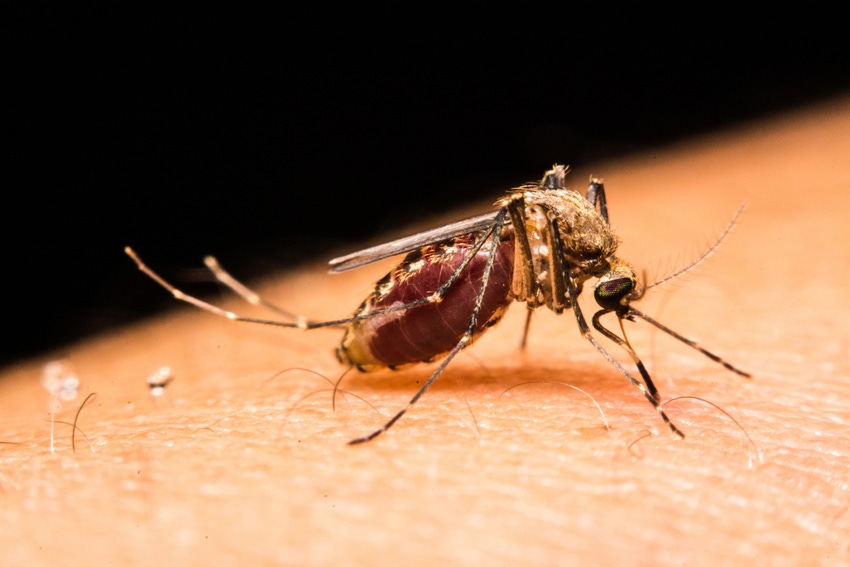October 17, 2018

An intense outbreak of mosquitoes in the Texas Coastal Bend has prompted public health and agricultural Extension officials to issue warnings to those who work and play outdoors.
The notice comes following six weeks of on-and-off rain showers that have dumped as many as 23 to 27 inches of rain across parts of the region causing river flooding and standing water in many fields, resulting in a major outbreak of mosquitoes across the area.
"It's the rains followed by a few days of dry weather and the repeat of that cycle over several weeks that causes the greatest risk of a major outbreak of mosquitoes," says Dr. Sonja Swiger, Texas AgriLife Extension Livestock/Veterinary entomologist in Overton. "The break in the rain gives adult mosquitoes the chance to lay eggs and other eggs to hatch, which sustains the cycle and helps the mosquito population to explode."
She says when those types of weather conditions exist, it's not only the floodwater variety of mosquitoes that become a problem but more dangerous disease-carrier types that can expand their numbers.
"Fortunately, the more aggressive mosquitoes are the floodwater variety. They are certainly troublesome. But the real concern is the vectoring varieties. We have had cases of equine West Nile Virus reported this year but not in Nueces County, and so far, no human cases reported there either. But rain events like those that have persisted in recent weeks raises concerns, though we are nearing the end of the busy mosquito season as temperatures begin to drop," she said.
But the latest cold front to blow through coastal areas this week may not fully address the mosquito risk completely. Swiger says cooler temperatures of 65 degrees and lower will slow the population growth of the flying pests, but a more sustained period of cooler temperatures is needed to provide complete control.
"As we all know, in Texas, especially in the early fall season, warm weather generally follows early cool snaps, and more frequently in areas located farther south in the state. In northern reaches of Texas, we may see some lasting mosquito relief from recent cool weather, but in Nueces County and across much of the Texas coast, we'll have to wait and see."
While significant mosquito outbreaks are no stranger to Texans, beyond the normal continuous aggravation of the swarming and biting insects, the larger concern is the diseases some varieties of the pests can carry. Historically, mosquitoes have threatened the state with major diseases like malaria and yellow fever. While those diseases have largely been controlled in most of North America, the threat of other diseases is still spread. They include West Nile Virus (WNV) and its more dangerous cousin, West Nile Fever. Also at the top of threat list is Dengue Fever, other forms of encephalitis, chikungunya and Zika viruses.
For agriculture, WNV is of greatest concern to equine, but other animals are susceptible, mostly among smaller animals of wildlife. WNV primarily affects birds, but can also infect bats, horses, cats, dogs, chipmunks, skunks, squirrels, domestic rabbits, and alligators.
"Local jurisdictions and individuals alike should concern themselves with mosquito control because of the impact they can have on the health of people and animals. In fact, mosquitoes affect the health of people and animals more than any other insect pest worldwide," reported Nueces County Agent Jason Ott in a press release late last week. "Texas Department of State Health and Human Services announced the West Nile Virus was found in one pool of mosquitos collected by Nueces County Vector Control near Aqua Dulce [earlier this month] prompting additional attention to mosquito control in that portion of the county by Nueces County Vector Control."
Ott says property owners should also exercise precautionary control measures to help eliminate mosquito breeding areas in their yards and to be watchful of water collected on the farm and ranch. Standing water in feed buckets, old tires and other areas could also be primary breeding grounds for mosquitos.
"Most mosquito species bite most actively at dusk and dawn. This is the case for the southern house mosquito, Culex quinquefasciatus, which is the most common vector of the West Nile Virus in Texas. However, this species also bites at night. The two mosquito species that transmit the Zika virus and many other diseases – Aedes aegypti and Aedes albopictus - bite during daytime, and at dusk and dawn," Ott noted in the release.
Farm and ranch workers and others who work or play outdoors should also take protective measures. Most mosquito varieties are more active in the early morning and early evening hours and working or playing outdoors during these times should be minimized as possible. Other protective measures can be taken including the wearing long sleeves to minimize skin exposure and the use of a quality mosquito repellant.
"A repellant that contains Deet is probably your best choice when it comes to effective control, but my experience indicates the normal Deet products contain like 8-percent Deet and with swarming and aggressive floodwater mosquitoes you are probably better off with deep woods variety of repellants that have as much as 25-30 percent Deet content. At some point around 30-percent, anymore Deet becomes useless because you are getting the maximum benefit already. So for the best repellant I would suggest a product with the larger amount of Deet, especially if you're working outdoors and need good protection," Swiger recommends.
She says generally the West Nile Virus season ends in late November and the greater amount of cooler weather that arrives before that date, the less likely the chance of contracting WNV. But she agrees that the best protection comes from eliminating or minimizing breeding grounds for mosquitoes and wearing protective clothing and using an effective repellent to ward off mosquitoes.
"Better yet, we can hope to get more cooler weather sooner than later," she said.
You May Also Like




